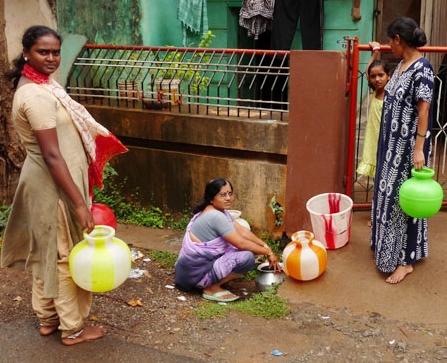The NextDrop project has been named one of the winners of the prestigious Knight News Challenge. The project originated in a School of Information course, and the team includes recently-graduated I School student Thejo Kote (MIMS '11); last month, Kote also won the school's James R. Chen award for outstanding master's final project for his work on NextDrop.
The Knight News Challenge is a media-innovation contest that aims to advance the future of news by funding new ways to digitally inform communities. The News Challenge awards as much as $5 million a year for innovative ideas that develop platforms, tools, and services to inform and transform community news, conversations, and information distribution and visualization.
The John S. and James L. Knight Foundation announced the winners yesterday at the MIT–Knight Civic Media Conference. NextDrop will receive a $375,000 award.
NextDrop addresses the challenge of unreliable piped water in developing countries by providing households with reliable, near real-time information about water arrival via the mobile phone infrastructure.
In almost all of the cities in South Asia and at least a third of those in the rest of Asia, Africa, and Latin America, families wonder every day whether they will have water. These millions of households have a piped water supply; however, water is only available through these pipes for a few hours at a time. Due to the pervasive unreliability of piped water supplies in developing countries, households lose immense amounts of time waiting for water to arrive, with the costs borne disproportionately by women and by the poor.
NextDrop promises households accurate and timely information about local piped water delivery, over cell phones already widely in use in India. This information comes from both the water suppliers and the water themselves. Participants receive micro-payments in exchange for calling the NextDrop system when water begins to flow in their locality. NextDrop verifies this information and then pushes announcements to other subscribers nearby. The project also uses this data to predict when water will arrive in nearby geographic areas.
In addition to Kote, the project team includes civil engineering master's student Anu Sridharan; Emily Kumpel, a Ph.D. student in civil engineering; Ari Olmos, a Berkeley public policy master's student, and Ashish Jhina, an MBA student at Stanford University. They are advised by I School assistant professor Tapan Parikh, a leader of the school's program in ICTD (Information and Communication Technologies and Development).
The idea for NextDrop was hatched in a fall 2009 School of Information course taught by Parikh. The course, Social Enterprise for International Development, trained students to create social enterprises for rural developing regions, using information and communication technologies. According to Parikh, the course is one of a kind. “Other courses have addressed engineering and product development challenges in developing countries; however, this is the first course that focuses on integrating information technology innovation and entrepreneurship for development,” he said.
At the conclusion of that course, the student groups presented their business plans for a panel of expert judges, who awarded a $5000 travel grant to the NextDrop project to pursue their business plan.
Since then, the NextDrop project has been awarded the grand prize in the 2011 Global Social Venture Competition, the Global Social Entrepreneurship Competition's information & communication technology prize, the Clinton Global Initiative University award for outstanding commitment, the 2010 CITRIS "Big Ideas" award, the James R. Chen award for outstanding master's final project, and the GSMA mWomen BOP App Challenge award.










